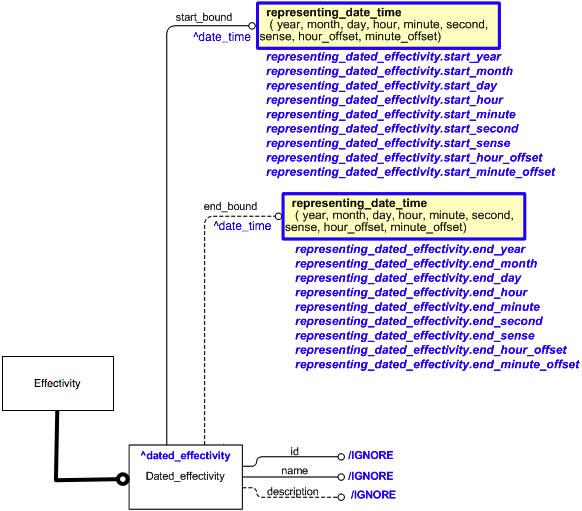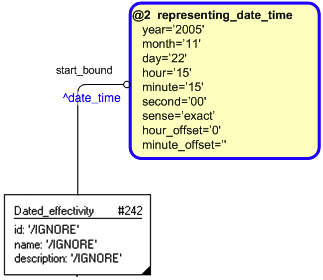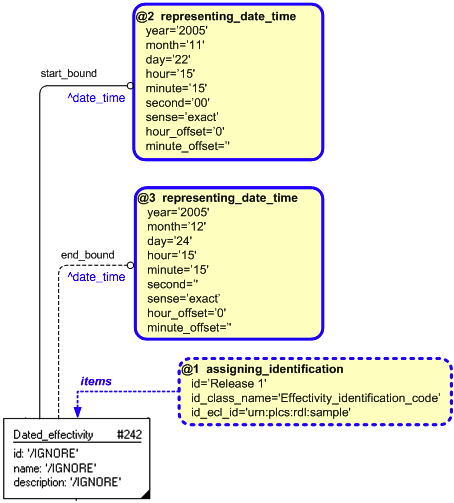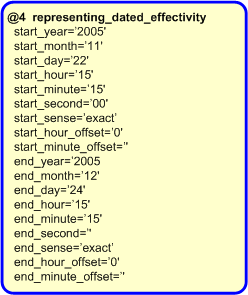| Template:— representing_dated_effectivity (rep_date_eff) |
Date: 2008/02/26 17:20:57
Revision: 1.16
|
This section specifies the template representing_dated_effectivity.
NOTE
An explanation of a template and the associated instantiation path is
provided in the
Template overview
section.
The EXPRESS-G diagram in
Figure
1
shows the templates and EXPRESS entities that are required
to represent the template
"representing_dated_effectivity".
The text highlighted in blue shows the template parameters.
Figure 1 — An EXPRESS-G representation of the Information model for representing_dated_effectivity
The graphic for the template to be used in other EXPRESS-G diagrams
is shown in Figure
2
below.
Figure 2 —
The graphical representation of representing_dated_effectivity template
The following input parameters are defined for this template:
Calendar_date
year_component of the effectivity start date and time.
Calendar_date
month_component of the effectivity start date and time.
Calendar_date
day_component of the effectivity start date and time.
Local_time
hour_component of the effectivity start date and time.
Local_time
minute_component of the effectivity start date and time.
This parameter is optional. If not given, it will remain unset.
Local_time
day_component of the effectivity start date and time.
This parameter is optional. If not given, it will remain unset.
The direction of the offset. Enumeration values: 'ahead', 'exact' or 'behind'.
The number of hours by which a time is offset from Coordinated Universal Time.
The number of minutes by which a time is offset from Coordinated Universal Time.
The value of this attribute need not be specified.
This parameter is optional. If not given, it will remain unset.
Calendar_date
year_component of the effectivity end date and time.
This parameter is optional. If not given, it will remain unset.
Calendar_date
month_component of the effectivity end date and time.
This parameter is optional. If not given, it will remain unset.
Calendar_date
day_component of the effectivity end date and time.
This parameter is optional. If not given, it will remain unset.
Local_time
hour_component of the effectivity end date and time.
This parameter is optional. If not given, it will remain unset.
Local_time
minute_component of the effectivity end date and time.
This parameter is optional. If not given, it will remain unset.
Local_time
second_component of the effectivity end date and time.
This parameter is optional. If not given, it will remain unset.
The direction of the offset. Enumeration values: 'ahead', 'exact' or 'behind'.
The number of hours by which a time is offset from Coordinated Universal Time.
The number of minutes by which a time is offset from Coordinated Universal Time.
The value of this attribute need not be specified.
This parameter is optional. If not given, it will remain unset.
The following reference parameters are defined for this template:
Allow the
Dated_effectivity
entity instantiated in this path to be referenced when this template is used.
%^target = $representing_dated_effectivity.dated_effectivity%
The instantiation path shown below specifies the entities that are to be
instantiated by the template.
-- Instantiate Dated_effectivity entity Dated_effectivity-- Bind the Dated_effectivity entity to the parameter dated_effectivity -- The dated_effectivity parameter is a reference parameter so the -- Dated_effectivity entity can be referred to when this template is used. %^dated_effectivity =
Dated_effectivity%
-- Set the Dated_effectivity attributes to be ignored Dated_effectivity.id = '/IGNORE'
Dated_effectivity.name = '/IGNORE'
Dated_effectivity.description = '/IGNORE'
-- Set up date for start_bound - Instantiate the representing_date_time template /
representing_date_time(
year=@start_year,
month=@start_month,
day=@start_day,
hour=@start_hour,
minute=@start_minute,
second=@start_second,
sense=@start_sense,
hour_offset=@start_hour_offset,
minute_offset=@start_minute_offset)/
-- representing_date_time has a reference parameter ^date_time -- which is bound to the entity Date_time -- Assign Dated_effectivity.start_bound to ^date_time %^start_date_time = $representing_date_time.date_time%
Dated_effectivity.start_bound ->
^start_date_time
-- Set up date for end_bound - Instantiate the representing_date_time template -- NOTE - this is optional /
representing_date_time(
year=@end_year,
month=@end_month,
day=@end_day,
hour=@end_hour,
minute=@end_minute,
second=@end_second,
sense=@end_sense,
hour_offset=@end_hour_offset,
minute_offset=@end_minute_offset)/
-- representing_date_time has a reference parameter ^date_time -- which is bound to the entity Date_time -- Assign Dated_effectivity.end_bound to ^date_time %^end_date_time = $representing_date_time.date_time%
Dated_effectivity.end_bound ->
^end_date_time
The following entities are instantiated with attributes as specified:
The instance diagram in Figure
3
shows an example of the EXPRESS entities and templates that are instantiated by the template:
/representing_dated_effectivity_start_date(start_year='2005', start_month='11', start_day='22', start_hour='15', start_minute='15', start_second='00', start_sense='exact', start_hour_offset='0', start_minute_offset='')/
(an illustration of the consolidated representing_dated_effectivity_start_date template is shown in
Figure
5 below.)
This is an example of when setting a start_bound dated effectivity, when e.g.
the end_bound date is not yet known. This may be used when the end_bound date is
dependent on other events, such as start date for installation (end date unknown
until part needs to be replaced, at which point the end_bound date for this
date_effectivity is set simultaneously as the start_bound date for the replacing part
is set).
Figure 3 — Entities instantiated by representing_dated_effectivity template,
when only start_bound attribute is used
The instance diagram in Figure
4
shows an example of the EXPRESS entities and templates that are instantiated by the template:
(an illustration of the consolidated template is shown in
Figure
5 below.)
/representing_dated_effectivity(start_year='2005', start_month='11', start_day='22', start_hour='15', start_minute='15', start_second='00', start_sense='exact', start_hour_offset='0', start_minute_offset='', end_year='2005', end_month='12', end_day='24', end_hour='15', end_minute='15', end_second='', end_sense='exact', end_hour_offset='0', end_minute_offset='')/
Note that the template
assigning_identification
is used in the diagram.
Namely:
@1 /assigning_identification(id='Release 1', id_class_name='Effectivity_identification_code', id_ecl_id='urn:plcs:rdl:std', items='#242')/
Figure 4 — Entities instantiated by representing_dated_effectivity template,
using both start and end_bound dates
The instance diagram in
Figure
5
shows the graphic symbol for the template that is to be
used in other instance diagrams. The example template is:
/representing_dated_effectivity(start_year='2005', start_month='11', start_day='22', start_hour='15', start_minute='15', start_second='00', start_sense='exact', start_hour_offset='0', start_minute_offset='', end_year='2005', end_month='12', end_day='24', end_hour='15', end_minute='15', end_second='', end_sense='exact', end_hour_offset='0', end_minute_offset='')/
Figure 5 — Instantiation of representing_dated_effectivity template
The following section details how the
representing_dated_effectivity
template can be optionally characterized by assigning
other constructs to it. These are characterizations commonly
applied to the template. The ISO 10303-239 EXPRESS model may enable
other assignments to the entities instantiated by the template.
The following characterizations may apply:
Characterization Assigning identifiers
NOTE this characterization is optional.





